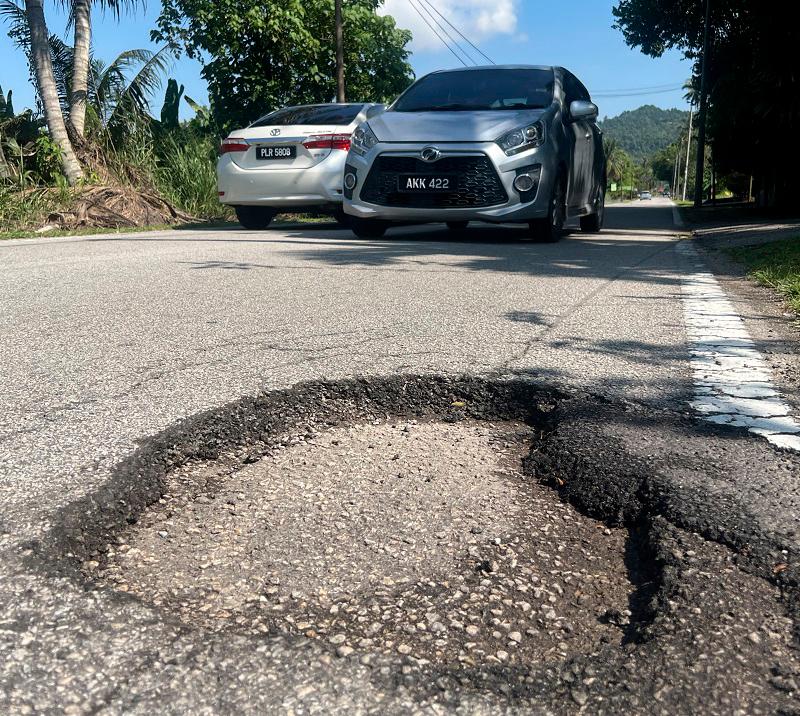PETALING JAYA: Despite ongoing repairs and resurfacing efforts, potholes remain a persistent issue in Malaysia, posing significant risks to motorists and highlighting deep-rooted flaws in road construction and maintenance practices.
Universiti Putra Malaysia Department of Civil Engineering head Assoc Prof Dr Fauzan Mohd Jakarni said the enduring pothole problem stems from poor material quality, construction flaws and inadequate maintenance planning.
“Malaysia’s roads are primarily built using flexible asphalt pavement, composed of hot mix asphalt – a blend of bitumen and crushed aggregates that forms the main structural material.
“However, even the best materials can fail prematurely if they are not properly designed, constructed or maintained,” he said.
Fauzan, who specialises in highway engineering and pavement materials, noted that frequent pothole formation is due to a combination of factors, including inconsistent material quality, low binder content, poor construction practices, water infiltration and the increasing load from heavy traffic.
“Malaysia’s tropical climate, with its heavy rainfall and intense heat, further exacerbates the breakdown of asphalt surfaces. Rain and heat cycles gradually weaken the asphalt and if cracks aren’t sealed early, water seeps in, undermining the layers beneath and causing potholes and premature failures.”
The dangers of potholes have tragically been highlighted by recent road accidents.
Earlier this month, a teenager lost his life after hitting a pothole while riding his motorcycle along the Kuantan-Cherok Paloh road near Kampung Hijrah in Pahang.
The impact caused him to lose control and be thrown onto the road.
Similarly, last month in Kluang, Johor, two secondary school students were killed when their motorcycle struck a pothole, causing a skid that led to fatal head and body injuries.
Fauzan identified inconsistent material quality as a major contributor to the persistent pothole problem, noting that roads are sometimes built with substandard aggregates or bitumen lacking the durability needed.
He also pointed out that compaction during construction often falls short of required standards.
“Without strict monitoring and testing, roads quickly become vulnerable to early damage, putting lives at risk. It is critical that aggregates and bitumen meet specifications, and that stricter material inspections are enforced. Furthermore, construction must be closely supervised, especially regarding paving quality, layer thickness, compaction density and surface drainage.”
While standard asphalt can work in Malaysia’s climate, Fauzan noted that conventional materials sometimes fail to offer adequate resistance to extreme heat and moisture.
He advocated a shift towards modified asphalt, such as polymer-modified asphalt or other climate-adapted mixtures, to strengthen road durability.
“Innovation in materials could be key to solving this issue. Research shows that incorporating polymers, fibres (such as those used in stone mastic asphalt) or even modified waste cooking oil can enhance asphalt’s flexibility, workability and moisture resistance.”
However, Fauzan stressed that the issues extend beyond construction alone.
“Malaysia’s road maintenance strategies fall short. While long-term maintenance plans have been introduced, they are not consistently applied across all regions and road categories. Too often, maintenance is reactive rather than preventive, allowing minor issues to fester until they become major, costly problems.”
He highlighted the need for roads to be engineered to accommodate rising traffic volumes and heavier loads.
“Roads must be designed to withstand heavier and more frequent traffic loads with stronger asphalt mixtures, thicker pavement structures and high-performance materials such as polymer-modified asphalt. Better drainage design, stricter axle load controls and smarter maintenance strategies – such as regular pavement condition monitoring – are crucial to ensuring road sustainability as traffic demands rise.”
Looking to the future, Fauzan believes that only by improving material quality, construction standards and maintenance management can Malaysia address its road durability issues.
“Without meaningful reform, potholes will remain a dangerous, costly and frustrating blight for road users.”









